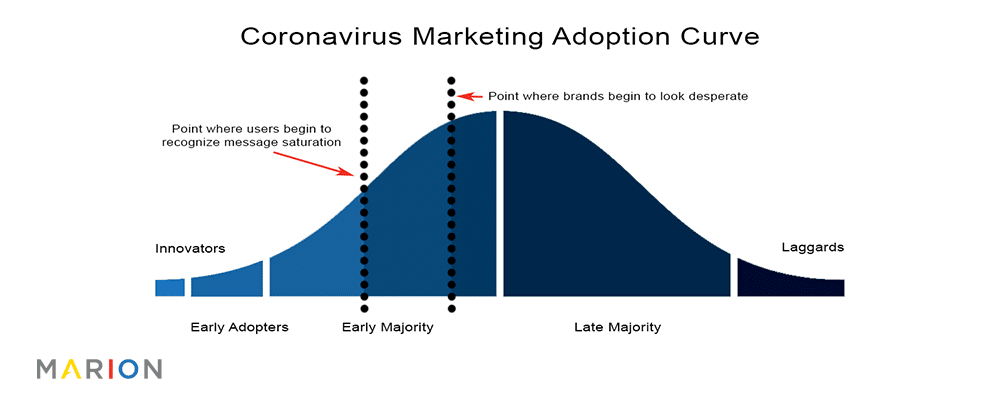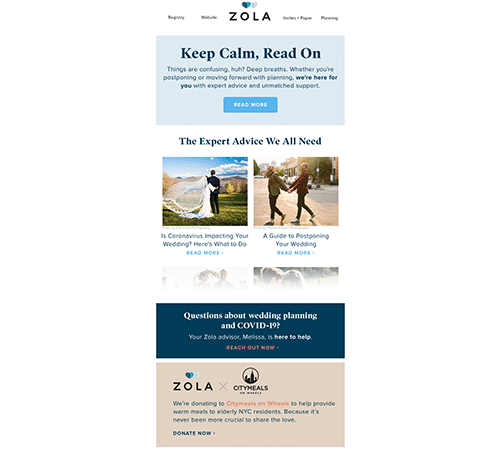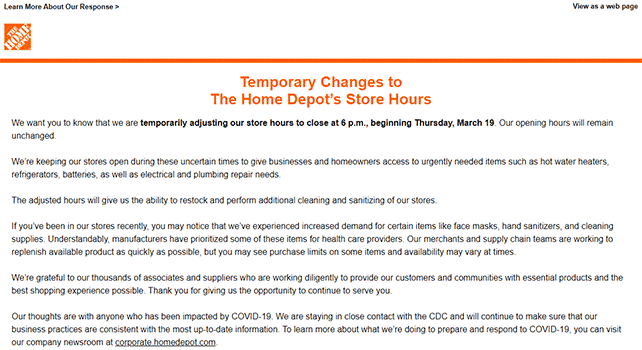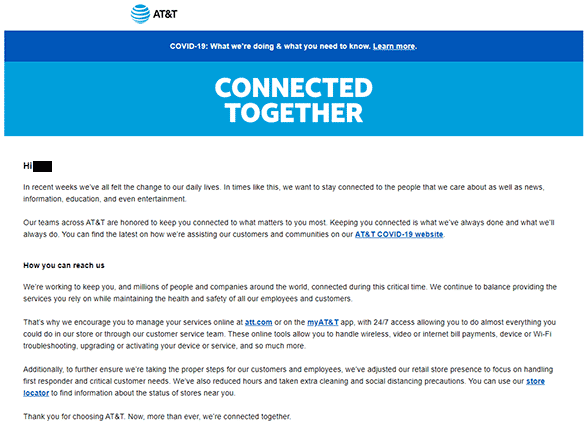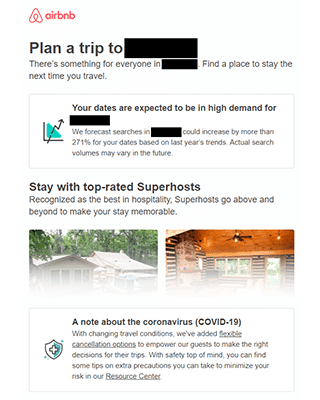You’ve probably received tens, if not hundreds, of marketing messages from businesses regarding the COVID-19 outbreak and accompanying economic crisis. The Coronavirus situation has escalated rapidly, and content marketing during the COVID-19 pandemic can easily hurt your brand despite your best intentions.
So, how often does your business need to communicate about the pandemic? What brand messaging has proven helpful? Is now the time to be opportunistic? We cover these important questions below.
First, Some Coronavirus Terminology
COVID-19 (which stands for Coronavirus Disease 19), is a respiratory disease caused by a novel (new) virus called “severe acute respiratory syndrome coronavirus 2 (SARS-CoV-2),” according to the WHO. The important distinction here is that the disease caused by the virus is COVID-19, while the virus itself is called SARS-CoV-2, a member of the Coronavirus family.
We’ve seen several misuses of the terminology. Maintain the professionalism of your brand by knowing and using the right terms in your messaging.
The Coronavirus Marketing Adoption Curve
There is quite literally a COVID-19 Marketing Adoption Curve that is a variation of the Product Adoption Curve.
Each message cycles through the innovators (brands that have developed and executed the concept), the early adopters, the early majority, the late majority, then the laggards.
You’ve seen this in action throughout March 2020. Some waves of popular messages include:
- “We’re Here to Help”
- “Our Hours of Operation Have Changed”
- “We’re Offering [Insert Special Offer Here] to Help”
- “Contactless Pickup Available”
- “[Insert Company Here] Executive Is Foregoing Salary”
- “Millennials Are too Old for Spring Break, It’s Gen Z You Want”
- “How to Avoid Boredom at Home”
Because of the rate at which these messages are adopted by brands, their COVID-19 Marketing Adoption Curve has a very short lifecycle. On our graph above, the two vertical dotted lines indicate:
- Where users recognize that they’re receiving a lot of similar messages
- Where the message starts to look insincere and can hurt brands that are still sending it
If trendjacking is your brand’s response to the Coronavirus marketing climate, then you’re probably not seeing trending messages until they’ve already reached the early majority stage. This means you could have as little as hours left to tailor the message to your audience before they’re desensitized to the concept.
What does this mean for you? Your company’s COVID-19 content marketing strategy needs to set some guidelines.
Dos and Don’ts of Coronavirus Content Marketing
Communication between your business and its customers is important, but there is a not-so-delicate balance between what you should and shouldn’t convey. Your entire digital marketing strategy during COVID-19 will need to evolve, but we’re talking specifically about your messaging right now.
We’ll start with Coronavirus content marketing practices that you should avoid (while doing our best not to throw anyone under the bus).
Don’t
Don’t engage in the following COVID-19 marketing practices:
- Send tone-deaf promotional emails that neglect the fear this pandemic is causing
- Use COVID-19 puns in promotional emails – “Is There a Bright Side to Coronavirus?” email subject line from a solar products company
- Try to drive foot-traffic to a local business
- Run exploitative promotions
- Send messages to your customers about your regular cleaning practices and that sick employees and customers should stay home – this should be business as usual
- Use the fear of disease spread as a value-added sales benefit – like pushing “touchless” household products
- Communicate empty “Virtue Signaling” – like a mortgage company sending an email to say “Your health and safety is our priority”
- Blatantly communicate your desperation or self-interest
Do
Make sure you consider the following practices while marketing during the COVID-19 crisis:
- Let customers know if your operations have changed, and an estimate of how likely these changes are to remain intact
- Send out updates as often as needed to adjust customer expectations of your business like
- We’re back in stock
- Now offering takeout and delivery
- Pause automated campaigns or messages
- Focus on marketing efforts that you can control like SEO and other owned media channels
- Address frequently asked questions from your customer base that are directly related to your products/services
- Show empathy in all communications
4 Examples of COVID-19 Content Marketing
We found some examples of good and bad corporate email marketing examples from the latter half of March. Many of these directly correlated with a “Do” or “Don’t” from the sections above.
1. Address Relevant FAQs Like ZOLA
Zola is a wedding registry and website company that makes it easy for soon-to-be-married couples to organize their pre-marriage events. At a time when the CDC is recommending that mass gatherings be postponed or canceled, many engaged couples have questions about their special day.
ZOLA faces these questions head-on by providing several educational resources and a line to an event advisor that can help adjust wedding plans. Their message is directly relevant to recipients and genuinely helpful to their target audience.
Subject Line: We’ll figure this out
Source: Zola
2. Communicate Changes in Store Hours Like Home Depot
Home Depot is a great brand role model to follow during the Coronavirus pandemic. They quickly emailed their customer base about changes in their store hours, as well as temporary shortages in certain products. Their subject line makes the email’s purpose clear and Home Depot kept the email relatively concise.
Subject Line: Temporary Changes to Our Store Hours
Source: Home Depot
3. Avoid Generic “Business as Usual” Messages
By this point, you’re very familiar with “We’re here for you” emails in your own inbox, and you’ve already developed a blindness to them. Because of the accelerated lifecycle of messages in our Coronavirus Marketing Adoption Curve, any brand still sending this out would be considered a laggard.
For existing customers, this email doesn’t communicate anything new. 24/7 access to your online account, and stores taking “extra cleaning and social distancing measures” are not need-to-know information.
Subject Line: [Your Name], AT&T is here for you.
Source: AT&T
4. Pause Automated Messages
The email below is an example of an automated message that should have been paused. Airbnb has an automated forecasting tool that would normally be helpful to customers, but in this case, it could be harmful to their brand.
With federal social distancing guidelines in place through the end of April, there is very little chance that demand will spike in the next few weeks. The catch-all disclaimer that “Actual search volumes may vary in the future,” is not as helpful as eliminating the automated email altogether.
This example makes it clear why your business should take a close look at the automated marketing systems you have in place.
Subject Line: Searches in [Target Location] for [Target Date] are expected to increase
Source: Airbnb
Want to Discuss the Impacts of COVID-19 on Your Marketing Efforts?
Your business has no doubt been impacted by the Coronavirus pandemic, and it can be difficult to evaluate the right marketing strategy. MARION has set up a Coronavirus marketing hub to help keep you informed.
We’re also extending free 30 minute marketing consultations to Texas-based businesses. Our Houston marketing agency has advanced experience with businesses employing anywhere between 5 and 150 employees.
Contact us today for help developing a marketing strategy for the present, and a strategy for the future economic rebound.





